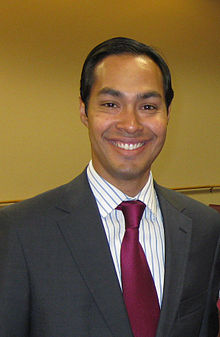Houston is chock full of ballot referenda this fall, but the most interesting and potentially consequential one in the state is San Antonio.
An initiative from San Antonio Mayor Julián Castro that would direct a portion of sales tax revenue to fund full-day pre-kindergarten unanimously passed the City Council, leaving it for voters to approve in November.
The pre-K funding initiative, which has the support of the education community and prominent business leaders in the city like Charles Butt of H-E-B and Joe Robles of USAA, is a major policy proposal for the San Antonio mayor, who was thrust into the national spotlight last week when he was chosen to keynote this year’s Democratic National Convention on Sept. 4.
The state currently covers half-day pre-K for children from low-income, English-language-learning, military and foster families. Many districts opt to offer a full-day program, which they did with the help of additional state grants before the Legislature in 2011 slashed more than $200 million allocated for that purpose.
Districts have tried various methods, including charging tuition, to keep full-day pre-K programs alive since the state funding was eliminated. But San Antonio’s is the first such effort initiated at the city level.
A coalition of business and education leaders, led by Castro, presented a proposal in June that would raise the sales tax in San Antonio by one-eighth of a cent to fund full-day kindergarten for about 4,000 children per year who aren’t currently served. The tax would raise an estimated $29 million annually, with an additional state match of at least $10 million. It is estimated to cost the average San Antonio household $7.81 per year.
The reason why this could be so consequential is that good pre-k programs give you a lot of bang for your buck. Mayor Castro’s proposal would not only fill the void left by the Lege with its irresponsible and destructive budget cuts, it would go further and perhaps set a template for the rest of the state to follow. Of course, what he’s proposing is something that should be funded by the state rather than localities, and as much as I applaud his vision and leadership I deplore seeing cities be forced to deal with the Lege’s abdication of its responsibilities. It’s like cleaning up after your kids instead of making them do it themselves; it just rewards bad behavior. But someone’s got to do something, and perhaps the success of this program will be part of the basis for a future run at the Governor’s mansion for Castro. Got to get it passed first, however, and that’s no sure thing. State Rep. Mike Villarreal has more.


The tax would raise an estimated $29 million annually…. It is estimated to cost the average San Antonio household $7.81 per year.
That math seems off. According to City-Data, there are 405,887 households in San Antonio, which would raise $3,170,000. I know SA gets a lot of visitors, but do they really generate almost 90% of the sales tax revenue of the city? What am I missing? Or did the article writer miss a decimal place?
The reason why the state is cutting back on spending is because we are in a budget crisis. It’s just like Mayor Castro to try to raise taxes during hard times. When everyone else is tightening their belts. He keeps taxing and spending… There is nothing in the city charter that sates they are in the education business. That is the school boards job.